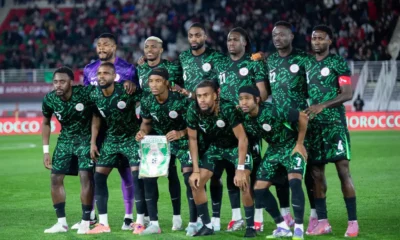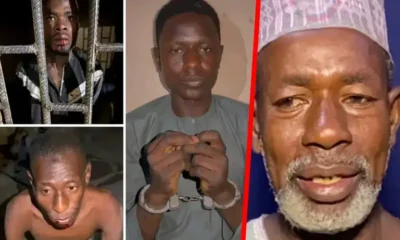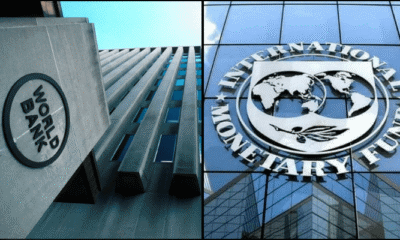News
FLASHBACK: Nigeria’s Illegal ‘Pipeline to Nowhere’: How Secret Oil Line Siphoned Crude for Nine Years Unprobed, Survived Three Administrations

Nigeria’s oil industry, the backbone of Africa’s largest economy, remains haunted by one of its boldest theft scandals—a secret four-kilometre pipeline that quietly drained crude for nearly a decade while successive governments and security agencies looked the other way.
A Pipeline Hidden in the Swamps
In October 2022, during President Muhammadu Buhari’s administration, the Nigerian National Petroleum Company Limited (NNPC Ltd) confirmed the discovery of an illegal connection to the 48-inch Trans-Forcados Export Trunkline.
The concealed line, buried deep in the mangrove swamps of Delta State’s Burutu Local Government Area, was first uncovered by Tantita Security Services, a private surveillance firm run by ex-militant Government Ekpemupolo (Tompolo).
Investigators traced the illicit link to an abandoned AGIP pipeline. It ran alarmingly close to a military post, allowing crude to be diverted offshore and loaded onto waiting vessels through a makeshift platform.
NNPC’s Group Chief Executive Officer, Mele Kyari, called the find “a monumental act of theft,” admitting that the operation had gone undetected despite “daily monitoring” of export systems.
Draining Nigeria’s Lifeblood
Energy officials estimated that the pipeline and other theft points were bleeding the country of up to 600,000 barrels of crude every day—triple earlier government estimates. The Atlantic Council, a U.S. think tank, pegged Nigeria’s annual losses to crude theft at $3 billion to $8 billion, enough to cripple foreign reserves and wreck OPEC production quotas.
Three Administrations, Zero Accountability
NNPC’s own timeline suggested the illegal pipeline operated for close to nine years, spanning three administrations:
- The final months of Goodluck Jonathan (2014–2015),
- The entire eight years of Muhammadu Buhari(2015–2023),
- And possibly late Umaru Musa Yar’Adua (2009–2010) if construction predates official estimates.
Experts and civil society groups say it is implausible that such a sophisticated operation, running meters from a military security post, could endure without high-level political or military protection.
Collusion Suspicions
Though no senior politician has been indicted, investigations revealed that logistics firms and shell contractors with ties to politically exposed persons were central to the crude-lifting network. Security operatives in Rivers and Delta States were repeatedly linked to protection rackets, but prosecutions have been limited to small-scale vandals and local operators.
The Socio-Economic Rights and Accountability Project (SERAP) and the Oil Spill Victims Initiative (OSPIVV) urged the government to publish the names of politically exposed persons and companies behind the cartel and to prosecute both local and international collaborators.
A National Shame
Nigeria has lost its position as Africa’s top oil producer, slipping behind Angola and even war-torn Libya, partly because of massive crude theft. With oil accounting for over 90% of foreign exchange earnings, the scandal worsened the country’s debt burden and triggered record deficits.
Despite awarding billion-naira surveillance contracts and deploying drones, ships, and armored vehicles, enforcement remains weak. No senior government or military official has faced public trial, and the identities of the masterminds remain shrouded in secrecy.
The Unanswered Question
After the “pipeline to nowhere” was exposed, Nigerians still ask:
Who built it, who protected it, and who profited while the nation bled billions?
Until those answers come, and until powerful beneficiaries face justice, the discovery of one illegal pipeline is less a victory than a reminder of how deep Nigeria’s oil corruption runs.
(Parallel Facts)
-

 News10 hours ago
News10 hours agoKaduna, police dismiss church attack, 100 worshippers’ kidnap
-

 News10 hours ago
News10 hours agoThe job scam syndicate luring Nigerians into Ukraine-Russia war
-

 Sports10 hours ago
Sports10 hours agoAfter AFCON Exploits, Super Eagles Rank Among Africa’s Top Three
-

 Metro10 hours ago
Metro10 hours agoFather of Kano murder suspect demands son’s death
-

 News9 hours ago
News9 hours agoIntersociety accuses New York Times of falsifying report, says Christian genocide data verified
-

 News10 hours ago
News10 hours agoAmnesty deal: Outrage mounts as Katsina moves to release 70 bandits
-

 Politics10 hours ago
Politics10 hours agoADC, Obidient collaboration will unseat APC – Odigie-Oyegun
-

 News10 hours ago
News10 hours agoNigeria’s fastest growth projection since 2015 can’t curb poverty


















